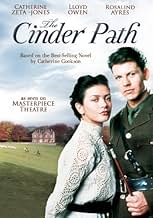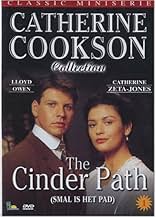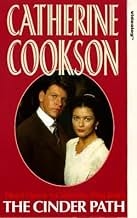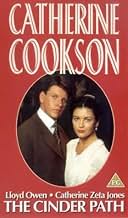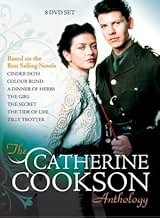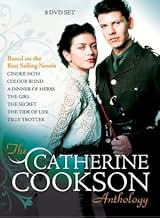Historia del hijo de un granjero que se lía con dos hermanas y luego va a luchar a las trincheras en la Primera Guerra Mundial.Historia del hijo de un granjero que se lía con dos hermanas y luego va a luchar a las trincheras en la Primera Guerra Mundial.Historia del hijo de un granjero que se lía con dos hermanas y luego va a luchar a las trincheras en la Primera Guerra Mundial.
Explorar episodios
Opiniones destacadas
In the film version of Catherine Cookson's classic The Cinder Path, Lloyd Owen finds himself in a love triangle between the beautiful Catherine Zeta-Jones and her sister Maria Miles. While that doesn't seem to be the biggest head-scratcher in the world, there's a lot more to the plot, putting Lloyd in quite a pickle before the film's even half-over. It's a period piece, set during WWI, and for fans of that time period, it's one of the best.
The casting is fantastic, with Antony Byrne as a menacing villain, Catherine Zeta-Jones as a love-to-hate English Scarlett O'Hara, and Lloyd Owen as a hero who's easy to root for but still frustrating enough to warrant some advice spoken aloud to your television. Maria Miles's pronunciation of "Charlie" is pretty hilarious, and it's a bit of a running joke in my house to imitate her.
All in all, there's a bit of everything in this story: love, war, death, repentance, revenge, blackmail, infidelity, and beautiful people wearing beautiful costumes. The Cinder Path is perfect to rent on a rainy afternoon after having tea with your girlfriends.
The casting is fantastic, with Antony Byrne as a menacing villain, Catherine Zeta-Jones as a love-to-hate English Scarlett O'Hara, and Lloyd Owen as a hero who's easy to root for but still frustrating enough to warrant some advice spoken aloud to your television. Maria Miles's pronunciation of "Charlie" is pretty hilarious, and it's a bit of a running joke in my house to imitate her.
All in all, there's a bit of everything in this story: love, war, death, repentance, revenge, blackmail, infidelity, and beautiful people wearing beautiful costumes. The Cinder Path is perfect to rent on a rainy afternoon after having tea with your girlfriends.
A correction to the above comment: The Cinder Path is not a BBC production it is a Tyne Tees TV production (ITV).
The downtrodden son of a farmer, married to one woman but in love with her sister, ships off to World War I in search of glory and redemption. On the front lines, he must battle not only the enemy but also the demons of self-doubt which have plagued him throughout his life. A miniseries presentation of Catherine Cookson's novel.
The hospital shots were filmed in Beamish Hall in County Durham. Town and shop locations are Beamish The North of England Open Air Museum, County Durham
WWI trenches shots were filmed on Tow Law Fell, County Durham.
The downtrodden son of a farmer, married to one woman but in love with her sister, ships off to World War I in search of glory and redemption. On the front lines, he must battle not only the enemy but also the demons of self-doubt which have plagued him throughout his life. A miniseries presentation of Catherine Cookson's novel.
The hospital shots were filmed in Beamish Hall in County Durham. Town and shop locations are Beamish The North of England Open Air Museum, County Durham
WWI trenches shots were filmed on Tow Law Fell, County Durham.
I just saw this film for the first time on DVD. I have watched it again a couple of times. It is a beautiful production that was well casted. I would have to strongly disagree with a previous review that cited Maria Miles' acting as the downfall of the film. I was quite taken with her acting, in fact, I thought she was a standout in the production. Lloyd Owen was a brilliant choice for the the part of Charlie. I'm inclined to say that Catherine Zeta-Jones was my least favorite casting choice, but perhaps it is because I am watching the film for the first time many years later after it was produced and the fact that I am more familiar with her as a celebrity than the other actors made her somewhat of an anachronism in the film.
The Cinder Path is a quite typical British TV-drama film/miniseries. It is one of those epic sorts of films that I really enjoy watching, like "Lorna Doone" or "Sharpe". Lloyd Owen, of the "Monarch of the Glen" fame, is quite impressive here as Charlie McFell, a man who was abused by his sadistic father and when his father is murdered, he protects the killer. He now has to take charge of the family farm, which is not an easy task for the introverted Charlie.He then hastily marries Victoria, daughter from a wealthy local family who is cold and deceptive. Zeta-Jones is outstanding in this part.
The story is very well crafted and builds up to a dramatic finale. Many are likely to find inspiration in the character of Charlie and his struggle to overcome his past and become a man of integrity. Hopeless romantics will also enjoy the romance between Charlie and Nellie, Victoria's much kinder sister.
All in all, this is as good as a BBC TV drama can get and also involves some impressively reenacted WW1 action. 9 1/2 out of 10.
The story is very well crafted and builds up to a dramatic finale. Many are likely to find inspiration in the character of Charlie and his struggle to overcome his past and become a man of integrity. Hopeless romantics will also enjoy the romance between Charlie and Nellie, Victoria's much kinder sister.
All in all, this is as good as a BBC TV drama can get and also involves some impressively reenacted WW1 action. 9 1/2 out of 10.
"The Cinder Path" was one of several novels by Catherine Cookson which were dramatised for television by Tyne-Tees Television between 1989 and 2001. These were the days when Britain's ITV network was divided into a number of regional franchises, each with its own distinct character. Tyne-Tees covered the North-East of England, the region from which Cookson came and in which most of her works are set.
Like most of Cookson's novels, "The Cinder Path" is a historical romance. In the Northumberland of 1913 Edward MacFell is a well-to-do but cruel and overbearing farmer. MacFell bullies his children Charlie and Betty- tyrannical fathers seem to be common in Cookson's stories- and his wife, to whom he is frequently unfaithful, but his worst treatment is reserved for his farm workers, whom he punishes for misdemeanours by forcing them to kneel on the sharp cinder path of the title while being beaten. One of the targets of his rage is a young man named Ginger Slater whom he whips for borrowing a book without permission.
Edward dies, apparently in a riding accident, early on in the story, and Charlie inherits the farm. (There is more to Edward's death than meets the eye, something which will later come back to haunt Charlie). He marries Victoria Chapman, the daughter of a neighbouring farmer, but the marriage is not a happy one, and they soon separate. Much of the story deals with Charlie's experiences after he is drafted into the Army during the First World War. He comes across Ginger Slater, now a sadistic and bullying sergeant, and eventually becomes an officer. He and Victoria remain estranged, but an attachment grows up between Charlie and Victoria's sister Nellie.
I have never read Cookson's novel, but to judge from this serial it would appear to have a complex plot with a rich cast of characters. (My above synopsis is very much a simplification of the story). The dramatisation focuses very much on Charlie, who is the central character but not necessarily the most interesting one. He comes across as a decent and straightforward young man, but in drama much of the interest lies with characters who are neither of these things. This serial left me wanting to know a lot more about some of these characters.
Ginger Slater, for example, starts off as a character with whom we can all sympathise- a poor boy, originally from the workhouse, who is treated shamefully by his cruel employer- yet ends up just as vicious as Edward. He presume that he has been warped by bitterness and resentment, yet we never really see this change in his character. Similarly, when Betty takes a shocking step near the end of the film, we are left unprepared. Her motive appears to be a sense of sibling rivalry with Charlie- she has long believed that she can run the farm better than he can- but for most of the film she has remained rather in the shadows and character and we do not see her character develop.
Sibling rivalry of a different sort appears to be at the heart of the relationship between the glamorous Victoria (played by a young, pre-stardom Catherine Zeta Jones) and her less attractive younger sister Nellie. Victoria is probably the least complex character in the story; she is portrayed as just plain bad, selfish and promiscuous. Nellie is more complicated. She can be just as promiscuous as her sister, but in her case this probably derives from low self-esteem, as does her alcoholism. Despite her vices, Nellie has a certain decency which Victoria lacks, and seems sincere in her feelings for Charlie. Again, however, she disappears from the action for much of the story, so her character is not as well developed as it might be. Perhaps an extra episode, or even two, might have been needed to do full justice to all Cookson's characters. 6/10.
Like most of Cookson's novels, "The Cinder Path" is a historical romance. In the Northumberland of 1913 Edward MacFell is a well-to-do but cruel and overbearing farmer. MacFell bullies his children Charlie and Betty- tyrannical fathers seem to be common in Cookson's stories- and his wife, to whom he is frequently unfaithful, but his worst treatment is reserved for his farm workers, whom he punishes for misdemeanours by forcing them to kneel on the sharp cinder path of the title while being beaten. One of the targets of his rage is a young man named Ginger Slater whom he whips for borrowing a book without permission.
Edward dies, apparently in a riding accident, early on in the story, and Charlie inherits the farm. (There is more to Edward's death than meets the eye, something which will later come back to haunt Charlie). He marries Victoria Chapman, the daughter of a neighbouring farmer, but the marriage is not a happy one, and they soon separate. Much of the story deals with Charlie's experiences after he is drafted into the Army during the First World War. He comes across Ginger Slater, now a sadistic and bullying sergeant, and eventually becomes an officer. He and Victoria remain estranged, but an attachment grows up between Charlie and Victoria's sister Nellie.
I have never read Cookson's novel, but to judge from this serial it would appear to have a complex plot with a rich cast of characters. (My above synopsis is very much a simplification of the story). The dramatisation focuses very much on Charlie, who is the central character but not necessarily the most interesting one. He comes across as a decent and straightforward young man, but in drama much of the interest lies with characters who are neither of these things. This serial left me wanting to know a lot more about some of these characters.
Ginger Slater, for example, starts off as a character with whom we can all sympathise- a poor boy, originally from the workhouse, who is treated shamefully by his cruel employer- yet ends up just as vicious as Edward. He presume that he has been warped by bitterness and resentment, yet we never really see this change in his character. Similarly, when Betty takes a shocking step near the end of the film, we are left unprepared. Her motive appears to be a sense of sibling rivalry with Charlie- she has long believed that she can run the farm better than he can- but for most of the film she has remained rather in the shadows and character and we do not see her character develop.
Sibling rivalry of a different sort appears to be at the heart of the relationship between the glamorous Victoria (played by a young, pre-stardom Catherine Zeta Jones) and her less attractive younger sister Nellie. Victoria is probably the least complex character in the story; she is portrayed as just plain bad, selfish and promiscuous. Nellie is more complicated. She can be just as promiscuous as her sister, but in her case this probably derives from low self-esteem, as does her alcoholism. Despite her vices, Nellie has a certain decency which Victoria lacks, and seems sincere in her feelings for Charlie. Again, however, she disappears from the action for much of the story, so her character is not as well developed as it might be. Perhaps an extra episode, or even two, might have been needed to do full justice to all Cookson's characters. 6/10.
¿Sabías que…?
- TriviaComedian Ross Noble worked as an extra and impromptu special effects technician on this mini-series. During a battle scene he was accidentally set alight causing delays in filming.
- ErroresThe German soldiers are wearing the Picklhauber helmets. As this is 1917 they would be wearing the M16 steel helmet.
- Citas
British Officer: Orders, protocol; the only thing they don't teach you is how to die with your guts hanging out. Does one cry "Carry on, men!" while pushing them back in or just let them drip while crying "Good luck, chaps!"?
- ConexionesFeatured in The Story of the Costume Drama: The Stars (2008)
Selecciones populares
Inicia sesión para calificar y agrega a la lista de videos para obtener recomendaciones personalizadas
- How many seasons does The Cinder Path have?Con tecnología de Alexa
Detalles
- Tiempo de ejecución2 horas 25 minutos
- Color
Contribuir a esta página
Sugiere una edición o agrega el contenido que falta

Principales brechas de datos
By what name was The Cinder Path (1994) officially released in India in English?
Responda
